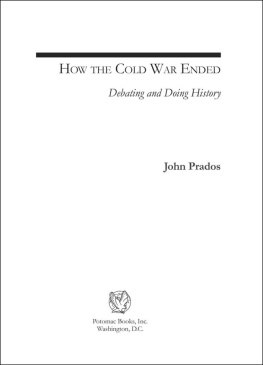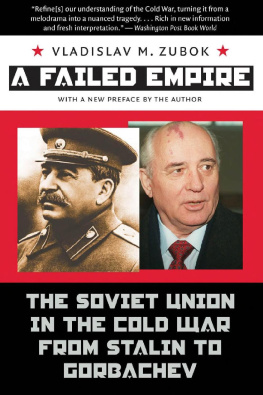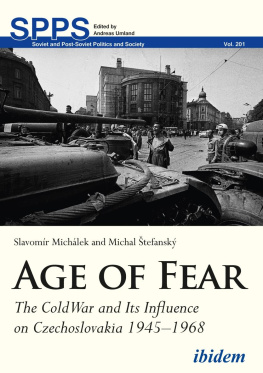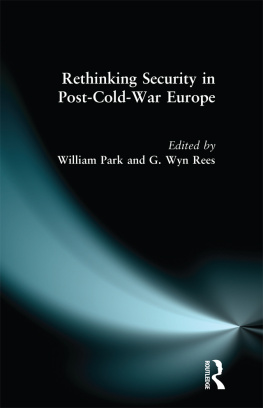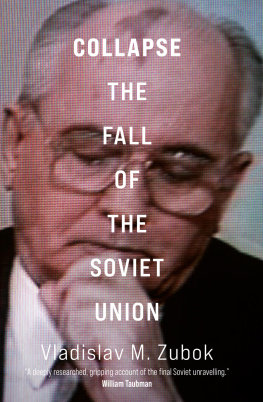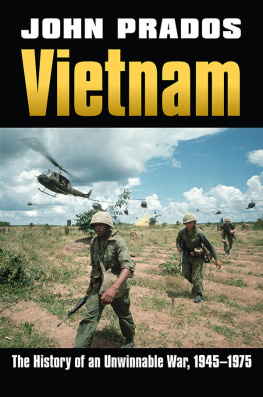HOW THE COLD WAR ENDED
Issues in the History of American Foreign Relations
Series Editor
Robert J. McMahon, Ohio State University
Editorial Board
Richard Immerman, Temple University
Melvyn Leffler, University of Virginia
Fredrik Logevall, Cornell University
Nancy Mitchell, North Carolina State University
David Painter, Georgetown University
William Stueck, University of Georgia
William O. Walker III, University of Toronto
Previously Published Titles in This Series
John F. Kennedy: World Leader (2010)
Stephen G. Rabe, University of Texas at Dallas
The Triumph of Internationalism:
Franklin D. Roosevelt and a World in Crisis, 19331941 (2007)
David Schmitz, Whitman College
Intimate Ties, Bitter Struggles:
The United States and Latin America Since 1945 (2006)
Alan McPherson, Howard University
The Color of Empire:
Race and American Foreign Relations (2006)
Michael L. Krenn, Appalachian State University
Crisis and Crossfire:
The United States and the Middle East Since 1945 (2005)
Peter L. Hahn, Ohio State University
HOW THE COLD WAR ENDED
Debating and Doing History
John Prados

Copyright 2011 by John Prados
Published in the United States by Potomac Books, Inc. All rights reserved. No part of this book may be reproduced in any manner whatsoever without written permission from the publisher, except in the case of brief quotations embodied in critical articles and reviews.
Library of Congress Cataloging-in-Publication Data
Prados, John.
How the Cold War ended: debating and doing history / John Prados. 1st ed.
p. cm. (Issues in the history of American foreign relations)
Includes bibliographical references and index.
ISBN 978-1-59797-174-4 (hardcover: alk. paper) ISBN 978-1-59797-175-1 (pbk. : alk. paper)
1. Cold War. 2. Cold WarHistoriography. 3. World politics19451989.
4. World politics19451989Historiography. 5. United StatesForeign relationsSoviet Union. 6. Soviet UnionForeign relationsUnited States. I. Title.
D849.P66 2010
909.828dc22
2010029048
Printed in the United States of America on acid-free paper that meets the American National Standards Institute Z39-48 Standard.
Potomac Books, Inc.
22841 Quicksilver Drive
Dulles, Virginia 20166
First Edition
10 9 8 7 6 5 4 3 2 1
To aspiring historians everywhere,
especially the young participants
at National History Day
CONTENTS
SERIES EDITORS NOTE
FROM THE BIRTH OF THE AMERICAN REPUBLIC in the late eighteenth century to the emergence of the United States as a fledgling world power at the end of the nineteenth century, the place of the United States within the broader international system of nation-states posed fundamental challenges to American and foreign statesmen alike. What role wouldand coulda non-European power play in a Eurocentric world order? The combination of Americas stunning economic transformation and two devastating world wars helped shatter the old European order, catapulting the United States into a position of global preeminence by the middle decades of the twentieth century. Since the mid-1940s, it has become common to refer to the United States as a superpower. Since the collapse of the Soviet Union, Americas only serious rival, and the concomitant end of the Cold War, it has become common to label the United States as the worlds lone superpower, or hyperpower, as a French diplomat labeled it in the late 1990s.
By any standard of measurement, the United States has long been, as it remains today, the dominant force in world affairseconomically, politically, militarily, and culturally.
The United States has placed, and continues to place, its own indelible stamp on the international system while shaping the aspirations, mores, tastes, living standards, and sometimes resentments and hatreds of hundreds of millions of ordinary people across the globe. Few subjects, consequently, loom larger in the history of the modern world than the often uneasy encounter between the United States and the nations and peoples beyond its shores.
This series, Issues in the History of American Foreign Relations, aims to provide students and general readers alike with a wide range of books, written by some of the outstanding scholarly experts of this generation, that elucidate key issues, themes, topics, and individuals in the nearly 250-year history of U.S. foreign relations. The series covers an array of diverse subjects spanning from the era of the founding fathers to the present. Each book offers a concise, accessible narrative, based upon the latest scholarship, followed by a careful selection of relevant primary documents. Primary sources enable readers to immerse themselves in the raw material of history, thereby facilitating the formation of informed, independent judgments about the subject at hand. To capitalize upon the unprecedented amount of non-American archival sources and materials currently available, most books feature foreign as well as American material in the documentary section. A broad, international perspective on the external behavior of the United States, one of the major trends of recent scholarship, is a prominent feature of the books in this series.
It is my fondest hope that this series will contribute to a greater engagement with and understanding of the complexities of this fascinatingand criticalsubject.
Robert J. McMahon
Ohio State University
INTRODUCTION
THE COLD WAR IS ONE of the most important international conflicts since World War II. It certainly dominated world politics over the last half of the twentieth century. How the Cold War ended remains contested historical terrain. Yet no basic understanding of todays worldor of the past century of historical developmentcan be complete without attention to this evolution. At a breathtaking pace, the tides of history cast up two superpowers, destroyed one of them, and planted many seeds for the decline of the second. The Cold Wars history telescoped into an even more furious last decade in which an empire collapsed, a superpower nation imploded, and another emerged standing, torn between contradictory impulses, on the precipice between triumphalism or consolidation. In the next century, observers of American history, diplomacy, and international politics will inevitably take the decade of the 1980s as a point of departure and the Cold War confrontation between the United States and the Union of Soviet Socialist Republics as a central element in their analyses. The impact of these events is uncontestable.
As Cold War conflict evolved over almost five decades, there were many, many discrete episodes of confrontation, ranging from sharp clashes such as the Cuban missile crisis of 1962 to slowly drawn-out developments such as the entrenchment of human rights values in world political thinking and subsequently in international diplomacy. There were dimly remembered but recurrent crises over Berlin; desert and jungle wars in Africa, the Middle East, and Asia; and a series of diplomatic achievements to reduce tensions, including agreements controlling nuclear weapons, building confidence in superpower restraint, or permitting the United Nations to exercise international peacekeeping functions.
With so much to choose from, I selected the Cold War decade of the 1980sthe end of the Cold Warfor four reasons. First, it
Next page
